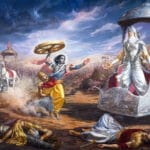In ancient times, armies would keep cities under siege for months, waiting—through a kind of psychological warfare tactic—until the city was forced to the point of surrender. Cities that resisted until lines of communication, food, and all other necessities of life were exhausted would in the end fall, or yield, after brief clashes.
The tactic of the Spanish commander Cortés in seizing cities was to win the support of tribes rival to the ruling one, and—alongside the necessary military force, intelligence, and moral backing—to invade a land entirely unfamiliar to him. In this way, by adding nearly ten thousand native tribal warriors to his force of around five hundred soldiers, he defeated the Incas [sic] and conquered Mexico.
During the Mongol invasion, the decision of the Anatolian principalities to align themselves with the Mongols against the Ottomans was likewise the product of a similar tactic. Similarly, it was through the cooperation of Turkish principalities with Timur that he was able to defeat Bayezid.
The global fascist coalition, in the aftermath of the Cold War, set about implementing its strategy of expansion across the world by employing these ancient stratagems of war. It advanced not only by targeting the territories it sought to occupy, but also by placing the entire globe under a form of psychological siege through its financial might, its control over communication, and its dominance in the entertainment sector. Many of the world’s peoples, much like rival tribes who had internal disputes with the Incas or the Ottomans, pursued the policy of “the enemy of my enemy is my friend,” either allying themselves with this aggressive force or, at the very least, remaining spectators to its occupation. In this sense, the success of global aggression owes much to the politics of local status quo powers that have wearied and alienated their own peoples.
This tragic reality, which we saw clearly in the concrete occupations of Iraq and Afghanistan, holds equally true within Türkiye. In the face of the global coalition’s projects and impositions, the stance of opposition groups and circles has been little different from that of the Native Americans, the Anatolian principalities, or the Iraqi and Afghan tribes. The status quo pays for its crimes by being abandoned at critical moments.
The process we are living through continues with the consequences of this tragic war game.
The dialectic of this process is simple: the status quo seeks to regenerate its legitimacy by citing the encirclement of external dynamics as a pretext; while opposing forces, invoking the old crimes of the status quo, abandon the ground of legitimacy by imagining that external dynamics will create opportunities for change.
The Joint Erosion of Religion and the State
The problem is not merely one of legitimacy. On a deeper level, the very foundations of the social subconscious begin to shift. Religion, as the language representing the collective self, and the state, as its spatial embodiment, fade, weaken, and lose significance in ways that, despite themselves, undermine the feelings of security, belonging, and asabiyya they once fostered. In this sense, the state begins to lose perhaps its only positive social function—providing a deep-seated sense of security—one that lies far beyond the sphere of day-to-day politics. Religion, meanwhile, falls into the paradox of false piety, wherein spiritual assurance and moral virtues are emptied of content, while its shell grows in such a way as to conceal the very void within. The result is the loss of society’s self-confidence and asabiyya.
The events that unfolded during the collapse of the Eastern Bloc were almost textbook illustrations of such a crisis. Socialism—substituted for religion and the powerful, Soviet-led state as an ideology—fell into a parallel crisis; and in the new vacuum, societies whose trust and asabiyya had been destroyed rushed, willingly and eagerly, into the arms of capitalism. Even decades after the Cold War, the power crises staged in Georgia and Ukraine were the latest examples of this kind of state-and-ideology crisis and its social reverberations. The democracy game staged with the help of a few civil society organizations and media outlets financed by George Soros went down in history as easy examples of mass manipulation that bypassed deeply rooted social values and perceptions.
Türkiye has been undergoing a similar process, particularly since February 28, 1997. Rather than sudden and chaotic manipulations, this process has proceeded through more refined and prolonged methods of social engineering, marked by critical turning points such as the August 17 earthquake, the 2001 economic crisis, and the rise of the AK Party to power. Thanks to the media and other tools for shaping public opinion, society has been virtually hypnotized; the collective self, exhausted by thirty years of internal strife, has all but thrown in the towel, fastening itself to the dream of EU membership. Almost every issue has been inflated and hollowed out, discussed as if in earnest but in reality reduced to empty spectacle—accompanied by demagogic media debates between a handful of sanctioned intellectuals, each representing a particular lobby—in a manner reminiscent of psychological warfare tactics.
On one hand, there is an air of inertia and uncertainty, as though everything has been left to its own devices, unfolding of its own accord; on the other hand, there are refined measures that reveal the execution of the most detailed economic, social, political, and psychological programs.
This controlled disorder is a symptom of the crisis of religion and the state—of the exhaustion of social trust and asabiyya—manifested in the inflation of the state, as an entity, and religion, as a system of higher values, into exaggerated shells that remain hollow and ineffective at their core. (The current government is the observatory of this dual exhaustion.) It is this mediocrity that has rendered Türkiye incapable of debating, resolving, or advancing its problems. For convenience, we may label this the “Second Tanzimat” process, for the Tanzimat (the Ottoman Reform Era) was the name given to change imposed by external dynamics. Yet our history—setting aside certain practices of the Republican era—is replete with examples of the inability to change through internal dynamics, of remaining captive to what exists, of a kind of paralysis. In most cases, Türkiye—or more precisely the state, in this context—has opened the door to external impositions as a way of breaking out of this paralysis born of the fear of losing what it already possesses.
Again, taking the example of the Tanzimat, over the past two centuries, ruling elites have preferred to draw power by securing the approval of foreign consulates, while the opposition has entered through this same door, relying on external dynamics to voice its demands and objections. Without considering Mustafa Reşit Pasha’s Anglophilism, the Francophilism of Ali and Fuat Pasha, the Russophilism of Mahmut Nedim Pasha, and the German alliance policies of Abdülhamid and the Committee of Union and Progress, how consistent can it be to question and condemn the Balkan peoples or the Arabs who rebelled against the Ottoman Empire for collaborating with Western powers? If the goal is to survive, to legitimize oneself, and to Westernize by leaning on the West, there is nothing incomprehensible about these peoples embarking on this path on their own, without needing Türkiye as an intermediary.
A similar process is taking place in Russia today. From the 1990s onward, the Russian elite turned toward cooperation with the West, yet regarded the gradual opening of their former satellites to the West, one by one, as betrayal. And yet, if there is betrayal, it is always on the part of those who first opened the way.
The “Treaty of Sèvres” Applied by the Oligarchy
Today, at the final stage of its history of dependence on the West, Türkiye wavers at a critical juncture between the United States and the European Union, between Westernization and its consequences. In this decisive moment, the state—representing the collective self and its asabiyya—is paying the price for the “Treaty of Sèvres” policies it has itself enacted. There is no other name than the Treaty of Sèvres—that is, the partitioning of the country and the nation—for the relentless exclusion, discrimination, and designation as internal enemies of leftists, Islamists, Kurds, Alevis, non-Muslims, and even the ultranationalist Ülkücüs, whether targeted in turn, together, or pitted against one another.
It is for this reason that the tears shed under external pressure by one wing of the oligarchic elite—who view the nation’s state as their own fief—or their claims to defend national unity, the homeland, and the state are wholly unconvincing. While the status quo, in a desperate bid to refresh its legitimacy, offers paranoid analyses that mix three truths with five falsehoods and feigns anti-imperialist reflexes, it has never once considered questioning the independence, existence, or survival of this country. Yet leftists, Islamists, and even some Ülkücüs, who have mounted practical opposition to the corrupt order, unjust distribution, Westernism, and discrimination in the name of genuine democracy, have watched the process unfold with regret.
Methods of suppressing dissent, silencing opposition, staging military coups, blacklisting, censorship, exile, purges, systematic torture, the burning of books and films… We must discuss these matters without for a moment forgetting that Türkiye’s history, alongside the building of schools, mosques, dams, factories, and roads, is also filled with oppression and cruelty. For society’s memory is by no means as weak as is assumed; it only appears to have forgotten due to the refined cunning distilled from historical experience—a preference for skirting the bush rather than grappling with the beast—but at the first opportunity, it voices its reaction in line with its general orientation. This is the true reason behind today’s interest in the EU. With the exception of a few genuine agents, society’s expectations of the EU are essentially an expression of these accumulated grievances. Almost every segment of society that has been beaten down by the state now seeks, indirectly, to settle accounts—or at least to see the infrastructure put in place to ensure it never happens again.
The status quo oligarchy, acting as though it owns the state and the army, has worn them down. It has sought to legitimize its dependence on Western states and global institutions such as NATO through realpolitik. It has divided the nation into camps and turned them against each other with its Treaty of Sèvres politics. Now it resorts to the cunning tactic of presenting all this as the scheme or plan of the United States or the EU. Those who have seen Türkiye as their fief on behalf of the West have continued to use this mode of governance as a way of keeping Türkiye dependent on the West—now with the added craftiness of absolving themselves and placing all blame on the West. In short, the aim is for the oligarchy to remain in power tomorrow as well. That is, oligarchy-driven anti-Westernism, anti-imperialism, anti-Americanism, anti-Europeanism, and so-called nationalism are false and just as unnational as Westernism, Americanism, Europeanism, and Zionism.
Therefore, to resolve the dialectic we emphasized at the outset, we can underline the following: while the status quo searches for a new basis of legitimacy, it should be isolated and allowed to collapse, and the opposition should be prevented from “breaking the fast out of anger at the infidel”—that is, from abandoning legitimate ground and becoming fodder for the West.
In this context, removing Türkiye from the pincer grip of both the neo-Westernist and the pseudo-nationalist factions—each fundamentally in cooperation with the West—must be the primary ground of both theory and action. In this context, we must begin to think beyond the two-hundred-year Tanzimat process of Westernization, toward a genuine “National Tanzimat” and democratic transformation.
Source: Ülke (Country) Journal, 2002









